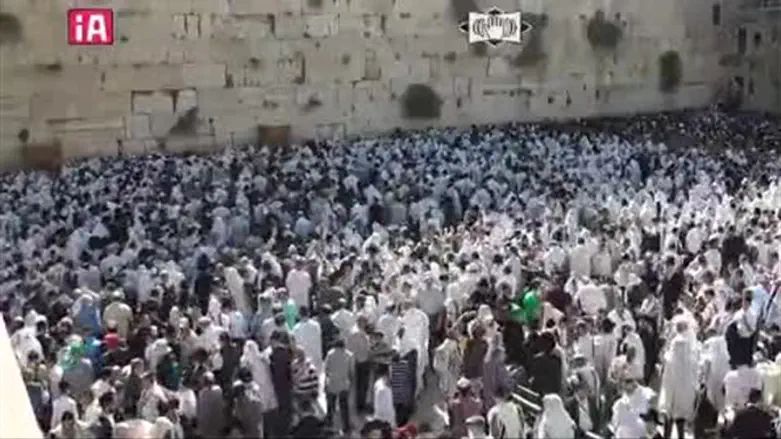
During such a chaotic period, the weekly Torah portion offers consolation. In the Naso parasha read on this past Shabbat, the famous priestly blessing appears:
"May Hashem bless you and protect you,
May Hashem shine his countenance upon you and be gracious unto you,
May Hashem lift up his countenance towards you and give you peace." (Numbers 6:24-26)
Blessing, protection, a shining divine visage, graciousness, peace.
For thousands of years, parents have been blessing their children with these words on Shabbat eve. At the end of the Amidah prayer, in Israel (in the Diaspora only on holidays) the kohanim also articulate this blessing before the congregation and it is instructive to pay attention to how the blessing is introduced.
Someone from the congregation cries out "kohanim!" at which point the kohanim cover themselves in their talit and say: *"Blessed art Thou Hashem our God, King of the universe, who... commanded us to bless the nation of Israel with love."*
The end of this blessing is rather astonishing. In other blessings, we do not say, for example, that we have been commanded to light Shabbat candles "with love" or that we have been commanded to eat matzah "with love." But in order to bless our fellow Jews, we must open our hearts with love. This is the kohen's pre-condition for bestowing the blessings of abundance and goodness upon the people. We too, through a positive attitude, generosity of spirit, and fellow feeling, can bring blessings into the lives of everyone around us.
It would be fitting then to speak exclusively about Yigal Yehoshua, of blessed memory. 56 years old, a victim of a lynching in Lod, who was murdered by rioters in our sovereign state.
It would also be fitting to speak solely of Gershon Franco, of blessed memory. He was handicapped and unable to reach a bomb shelter, and so he was killed by a missile that landed in Ramat Gan.
It would also be fitting to speak only about Elazar Barzilai, a teacher and father of four, who was attacked by a lynch mob in Akko. Yesterday his condition improved, he began to respond, and even squeezed someone's hand.
It would be fitting to speak about more victims, many of whom did not make the headlines. To send them our regards, to ask about their condition. And, in general, we should be checking the status of every city, town, and community and the health of every family, those with a fortified safe room and those without.
But one tragic event followed the next, and we witnessed one horrible scene after another. You hear about a shopkeeper whose store was looted and, the very next moment, about volunteers who came to fix up a synagogue that was burned. Every matter is important and urgent and precious, and so we are unable to devote proper attention to everything that is happening around us.
So I looked at the Torah portion of the week and found again the words of the Priestly Blessing that are pertinent to all of us at this time, in every place and in every challenging situation.
Rabbi Moshe Grilak writes that the priestly blessing is a daily exercise for all of us. A permanent exercise that teaches us about love. In an era of such hatred but also an era of charlatans who offer fake magical cures, in an era when you never know where your charitable contribution really goes, this Torah portion reminds us that in every synagogue in our neighborhood, every morning, this powerful blessing is given, at no charge and with love.
• Translation by Yehoshua Siskin